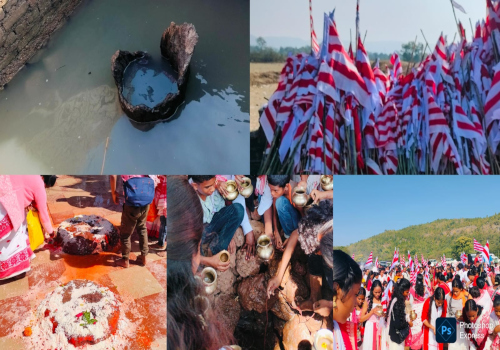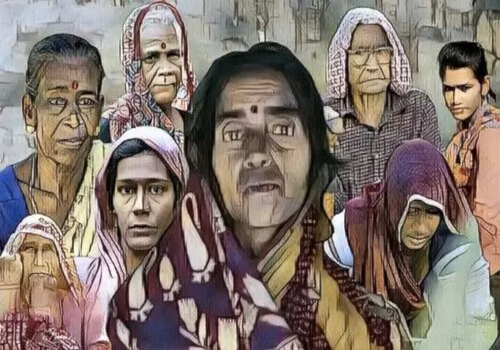आशा है कि पाठक गांधी के निम्न पत्र को दिलचस्पी से पढ़ेंगे. पत्र मूलत: अंग्रेजी में है.
I have many times noted that you have referred to the Hindus and theMuslims as two ‘races’ in India. In my humble opinion, it is only lessmischievous to speak of these two religious communities as ‘races’ than it isto call them two ‘nations’ as aMussalman correspondent of yours once did.(Young India, 24-7-’24)
यह बात मेरे ध्यान में कई बार आई है कि आपने हिंदुओं और मुसलमानों का उल्लेख भारत की दो’प्रजातियों’ के रूप में किया है. मेरी नम्र सम्मति में इन दो धार्मिक समुदायों को ‘प्रजातियां’कहना हानिकर तो है; किंतु उनको दो ‘राष्ट्र’कहने की अपेक्षा कम हानिकर है. आपके एक मुसलमान संवाददाता ने एक बार ऐसा प्रयोग किया. (यंग इंडिया, 24-7-24).
The fact is that about 90 per cent of the Mussalman Indians (I would call them so, and not Indian Mussalmans, as they are wont to call themselves) are of the same ‘race’ or races as the Hindus — having been descended from Indian ancestors who embraced Islam in India itself. As for the remaining 10 per cent of the Mussalman Indians, though they may have some drops of Turkish, Tatar, Arab, Pathan, Persian or Abyssinian blood in their veins, yet it is so much intermixed with native Indian blood by inter-marriage down through the generation that those 10 percent may safely be designated as 90 per cent native by race.
सच्चाई यह है कि मुसलमान भारतीयों में से (मैं उन्हें इसी नाम से पुकारूंगा और जैसा वे अपने आपको पुकारने के अभ्यस्त हैं, उस तरह उन्हें भारतीय मुसलमान नहीं कहूंगा) लगभग 90 प्रतिशत उसी ‘प्रजाति’ या ‘प्रजातियों’ के हैं, जिनके हिंदू हैं, क्योंकि उनके पुरखे भारतीय थे और भारत में ही मुसलमान बने थे. शेष 10 प्रतिशत मुसलमान भारतीयों के रक्त में तुर्कों, तातारों, अरबों, पठानों, ईरानियों या अबीसिनिया के लोगों के रक्त का थोड़ा मिश्रण हो सकता है. फिर भी पीढ़ियों तक आपसी विवाह सम्बन्धों से उसमें इतना भारतीय रक्त मिल गया है कि इन 10 प्रतिशत लोगों को भी प्रजाति की दृष्टि से बिना किसी जोखिम के 99 प्रतिशत इसी देश की जाति कहा जा सकता है।
In fact, the Hindus and Mussalmans in India no more represent two races than do the Protestantsand Catholics in England. It is a question upon which history, ethnology and anthropometry can fairly accurately pronounce. But above all, whatever theracial constitution of their blood, the fact cannot be denied that all of them (cent per cent) were born in India, are living in India, will die in India and beburied in India, like their fathers before them. And India is one country, and therefore they are all of one nation with Hindus. If only they were to regard themselves in Indian politics as Mussalman Indians, and not Indian Mussalmans!
असल में भारत के हिंदू और मुसलमान दो प्रजातियों के लोग नहीं हैं, ठीक ऐसे ही जैसे इंग्लैंड के प्रोटेस्टेंट और कैथॉलिक दो प्रजातियों के लोग नहीं हैं. यह प्रश्न ऐसा है, जिसके सम्बंध में इतिहास, मानव-जीवन रचना शास्त्र और नृवंश विज्ञान से काफी सही सबूत प्राप्त किये जा सकते हैं. इसके अलावा उनके रक्त की प्रजातीय रचना चाहे कुछ भी हो, इस तथ्य से इनकार नहीं किया जा सकता कि वे सभी शत-प्रतिशत अपने बाप-दादों की तरह भारत में पैदा हुए थे, भारत में रह रहे हैं, भारत में मरेंगे और भारत में ही दफनाये जायेंगे. और, भारत एक देश है और इसलिए वे उसी एक राष्ट्र के लोग हैं जिसके हिंदू. आवश्यकता केवल यह है कि वे अपने आपको भारतीय राजनीति में भारतीय मुसलमान नहीं, बल्कि मुसलमान भारतीय मानें.
All the above applies mutatis mutandis also to Christian Indians, the third important religious community in India. (Perhaps no religious community in India or outside is of one race. Certainly not the Hindus. Then why speak of any community as a race?) Let our Christians, too, in their country’s politics treat themselves as Christian Indians, even as their fellowsin faith are doing in Egypt, Palestine, China, Japan and the Philippines.
उक्त बातें थोड़े हेर फेर से ईसाई भारतीयों पर भी लागू होती हैं; जिनका भारत के जातीय समुदाय में तीसरा महत्वपूर्ण स्थान है. कदाचित् भारत में या अन्यत्र किसी भी धार्मिक समुदाय में एक ही प्रजाति नहीं है. निश्चय ही हिंदू भी एक प्रजाति के लोग नहीं हैं. तब किसी एक समुदाय को एक प्रजाति क्यों कहना चाहिए? हमारे ईसाई भाइयों को भी अपने देश की राजनीति में अपने-आपको ईसाई भारतीय मानकर चलना चाहिए, जैसा कि मिस्र, फिलिस्तीन, चीन, जापान और फिलिपाइन में उनके धर्मबंधु कर रहे हैं.
गांधीजी ने उक्त पत्र के अंत में यह टिप्पणी लिखी– “पत्र लेखक का पक्ष इतिहास की दृष्टि से ठीक है. जो शब्द किसी विशेष अर्थ में चल पड़े हैं, उनके प्रयोग की आदत छोड़ना कठिन है. ‘दो समुदाय’ शब्दों पर भी यही आपत्ति की जा सकती है. मैं केवल यही वचन दे सकता हूं कि भविष्य में सावधानी बरतूंगा. सावधान पत्र लेखक ‘यंग इंडिया’ की भाषा को तथ्यों के अनुकूल रूप देने के प्रयत्न में इसी प्रकार सदैव सतर्क रहें.
The correspondent’s position is historically accurate. It is difficult to get out of the habit of using words which have passed current with a definite meaning. Even “two communities” is open to the same objection. I can only promise to be careful in future. The watchful correspondent must not relax his effort to make the language of Young India accord with facts.












